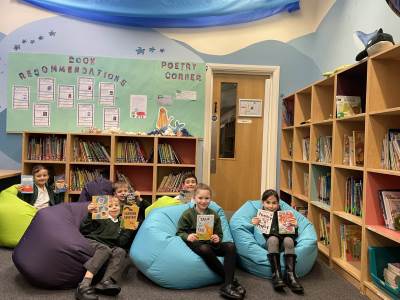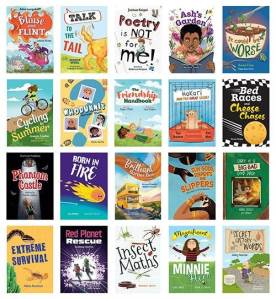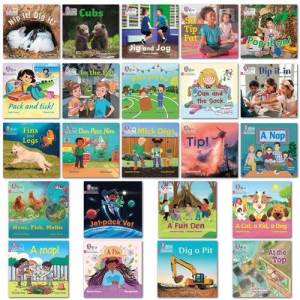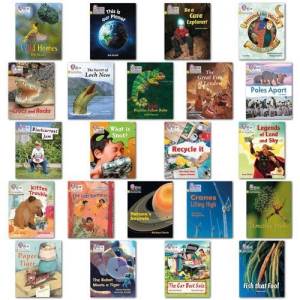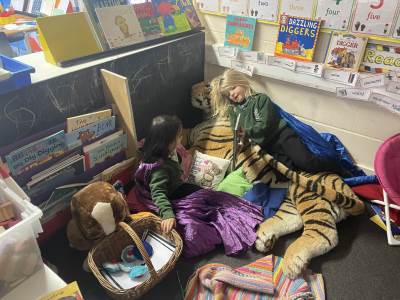Reading and Phonics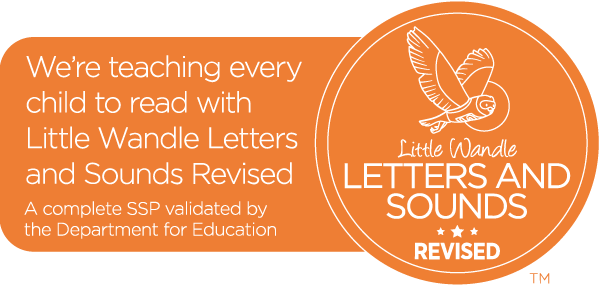
How is Reading taught at Trafalgar
Reception children have a daily phonics lesson which follows the progression for Little Wandle Letters and Sounds and this continues into Year One to ensure children become fluent readers. We teach phonics every morning with Reception sessions starting at 10-15 minutes and building up to around 25 minutes with additional daily oral blending games built into each day. Each Friday, we review the week’s teaching to help children become fluent readers.
Reception phonics teaching begins in Week 2 of the Autumn term to ensure children make a strong start. We follow the Little Wandle Letters and Sounds Revised expectations of progress. Four new phonemes and their corresponding graphemes are taught (GPCs) each week and they are then reviewed on Fridays. Children will also learn tricky words during these sessions.
In the Autumn and Spring term, Reception children learn phase 2 and phase 3 GPCs and then will spend the final term learning phase 4
Year 1 begin the Autumn term with 3 weeks of revision of phases 2, 3 and then begin to learn phase 5, which will be completed by the end of the year.
Year 2 children will begin the year by revisiting phase 5 and other previously taught phases to ensure all children are completely confident with applying these GPCs in both their reading and their writing. They will then move on to Little Wandle Bridge to Spelling followed by the Year 2 spelling content.
Half termly assessments take place throughout Reception and Year 2 to help inform future teaching and help identify children who may have gaps in their phonic knowledge and need additional practice. Daily assessment of learning also takes place within the classroom so staff can quickly identify any children who are in danger of falling behind and provide the appropriate daily ‘Keep Up’ intervention.
Please visit the parent area of the Little Wandle website or log in to our E-school for support with pronunciation of sounds.
In addition to their phonics practice book, your child will also bring home a sharing books and a library book which are chosen by your child to share with you at home. These books form part of approach to develop a life long love of reading.
Reading practice sessions with fully decodable texts
Children in Reception, Year 1 and 2, read fully matched decodable books with an adult 3 times a week during our ‘Flood Reading Practice’ sessions. These sessions are 15/20 minutes long. The children then bring home these books to read at home, building their reading fluency, developing phonetic knowledge prosody and comprehension skills. These 3 reading practice sessions at school each have a different focus;
Session 1 – decoding – using phonics and knowledge of tricky words to read the text.
Session 2 – prosody – developing the use of expression when reading
Session 3 – comprehension – developing the ability to find information and answer questions about the text.
Our reading books in Reception, Y1 and Y2 are Little Wandle Letters and Sounds Revised Big Cat books and Fluency books; including both fiction and non-fiction texts.
This book has been carefully matched to your child’s current reading level. If your child is reading it with little help, please don’t worry that it’s too easy – your child needs to develop fluency and confidence in reading.
Listen to them read the book. Remember to give them lots of praise – celebrate their success! If they can’t read a word, ask them to decode (sound it out) and blend it. After they have finished, talk about the book together.
Reading for pleasure
Reading and books develop a child’s imagination, deepen their receptive and expressive vocabulary and help children to understand the world they live in; that is why we believe reading for pleasure is vital.
At Trafalgar our aim is for all children to develop a life-long love of reading and Reading for Pleasure remains a whole school priority. Reading enjoyment has been reported as more important for children’s educational success than their family’s socio-economic status (OECD, 2002). We believe that a whole school Reading for Pleasure culture must be planned for and promoted throughout the school in a variety of ways, ensuring that all children have the opportunity to develop that real love of reading.
We choose high quality, diverse texts to support all areas of our curriculum, ensuring they support the development of our children's vocabulary as well as inspiring and engaging them to read.
Story time is protected at Trafalgar and all classes stop to share a story at the end of the day, with all staff and children taking part.
Throughout the school day , children have opportunities to read independently, including being able to select texts independently from reading corners and libraries so they can to continue to develop their love of stories. We are very fortunate to have a large, well stocked library which the children can visit as a class to support their learning and in small groups to browse and select a book of their choice to take home.
How you can help at home
Although your child will be taught to read at school, you can have a huge impact on their reading journey by continuing their practice at home. There are two types of reading book that your child will bring home in Reception and Year 1.
This book has been carefully matched to your child’s current reading level. If your child is reading it with little help, please don’t worry that it’s too easy – your child needs to develop fluency and confidence in reading.
Listen to them read the book. Remember to give them lots of praise – celebrate their success! If they can’t read a word, ask them to decode (sound it out) and blend it. After they have finished, talk about the book together.
Please use your child's reading diary to comment on your child's reading at home, this is very helpful for their teacher. This diary also includes information about the different sounds and Tricky words your child will be learning. Additional information can also be found on our E-school. We will stamp an write a comment in your child's reading diary each week.
Throughout the year we will run a series of reading and phonics workshops.
Phonics Screening Check (PSC)
This is a statutory phonics check that takes place in the same week in June every year. Phonics is a crucial part of learning to read and this check, (along with our own assessments), enables schools to assess children’s ability to decode individual words. It is not an assessment of wider reading ability, but provides useful information about individual children’s decoding ability.
The children take the check in a quiet area of the school, one to one with a teacher they know. It takes about 15 minutes to complete and our children are used to completing regular phonics assessments and this is in no way stressful for them.
The children read from a booklet with four words to a page, so no page looks too daunting. The words gradually become more challenging, but can all be sounded out using the child’s phonic knowledge. As well as real words there are pages of pseudo words which are included because they can only be read through phonic strategies. Each pseudo word is accompanied by a picture of an alien, so the children know these as alien words and will have previously encountered similar words.
The pupils are scored against a national standard (threshold is determined by the DfE). We will inform you of their result in their end of year report. If your child doesn't achieve the required score they will re-take the Phonics Screening Re-check in year 2.
We use the information from the Phonics Screening Check together with our internal Little Wandle Letters and Sounds Revised tracking to ensure that there are no gaps in a child’s phonic knowledge and to inform our provision in Year 2.
Little Wandle Phonics Progression Document
Little Wandle and the National Curriculum
Little Wandle and the Early Years Framework
KS1 Reading Curriculum Overview
EYFS and KS1 Reading


